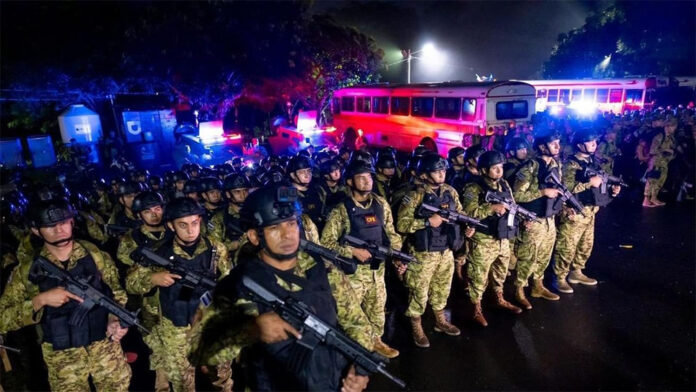by El Reportero wire services
Salvadoran authorities established fences in three communities in the nation, given the growing number of complaints of criminal activity in those areas
The president of El Salvador, Nayib Bukele, announced early this Wednesday the deployment of 3,500 Army soldiers and 500 police officers to establish fences in three communities in the nation, within the framework of the Government’s fight against gangs.
The measure, which is implemented in execution of the ‘Extraction’ phase of the Territorial Control Plan (PCT), concerns the Valle Verde and Popotlán colonies in the municipality of Apopa, as well as La Campanera, in the municipality of Soyapango.
“We are not going to stop until we capture the last remaining terrorist. We will not allow small remnants to regroup and take away the peace that has cost us so much,” Bukele wrote on his X account, attaching a video with the deployment of the teams. of security.
For his part, the Minister of Justice and Public Security, Gustavo Villatoro, stated in a press conference that the fences were established after a “call from the population”, which warned that criminal groups are still active in the area. “This fence will be maintained in the face of a growing number of complaints about gang members who continue to operate in that sector,” said Villatoro, quoted by the local press.
Meanwhile, the National Civil Police (PNC) detailed in a series of publications that its agents have intensified the verification of the legality of housing and car documents, along with other measures.
For his part, the head of Justice reported that the Security Cabinet presented this same day, before the country’s Legislative Assembly, a request to once again extend the emergency regime, which has been in force since March 2022.
Javier Milei accuses Kirchnerism of trying to “outlaw the most voted force” in the primaries
The candidate for president of Argentina for La Libertad Avanza rejected the Government’s complaints against him for promoting a bank run
The Argentine presidential candidate Javier Milei, for La Libertad Avanza (LLA), assured this Wednesday that the Government is trying to “outlaw” the far-right party, after President Alberto Fernández denounced it for, allegedly, generating a bank run that increased the price of the parallel dollar abruptly.
“Kirchnerism is trying to dirty the electoral process or even ban the political force that obtained the most votes in the primary elections (PASO), because they know that we are about to win in October and end their Government of criminals forever,” he stated. the economist at a press conference.
Milei thus responded to the accusations that, from both the ruling party and the opposition, hold him responsible for the notable jump in the price of the ‘blue’ dollar, which is traded outside banking channels. This Wednesday, the informal currency reached 1,010 pesos, a fact that worries him considering that its value impacts the real economy and the level of inflation.
“I tell President Fernández, Vice President [Cristina] Kirchner and the acting president (sic), the Minister of Economy [Sergio] Massa, that nothing will be able to prevent the beating that we are going to give them at the polls,” Milei predicted in response to the Peronist Government’s complaint for “public intimidation.”
What is Milei accused of?
The controversy began on Monday, when Milei declared in a radio interview that “the peso is the currency issued by the Argentine politician,” so “it cannot be worth anything.” “That garbage isn’t even good for compost,” she continued.
Additionally, he advised the population that has savings in fixed-term deposits to wait for maturity and immediately buy dollars, in the interest of the foreign currency appreciating due to the increase in demand.
“Telling Argentines to stay in pesos is condemning them to the most absolute poverty,” the candidate reiterated this Wednesday before a group of journalists.
After his statements, multiple sectors accused Milei of encouraging hyperinflation to win the presidential elections in the first round.
In the complaint presented by President Alberto Fernández it is admitted that the exchange instability originates from a set of factors, although the “decisive” effect of Milei’s incendiary statements on the rise of the national currency is highlighted, since the scenario of high economic uncertainty added the weight of his word as a candidate who leads in the polls for the first round of the elections scheduled for October 22.
Among his electoral proposals, Milei promotes the dollarization of the Argentine monetary system, a measure that both the ruling party and the rest of the opposition candidates reject as inconvenient, and, furthermore, impossible to put into practice due to the shortage of foreign currency.



